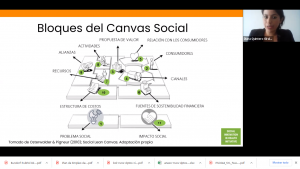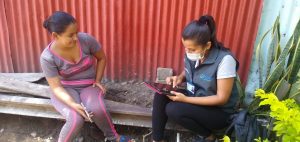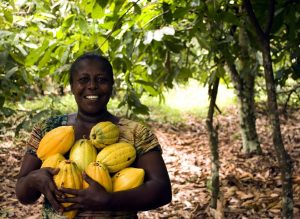Connecting the dots: Innovation for closing social gaps
by Diana Quintero Giraldo
I am the second generation of a low-income rural family that migrated to the city to increase their opportunities. My family origins have given me a deep understanding of the social gaps between rural and urban communities in Colombia. Thus, I committed to finding solutions for overcoming access limitations to social services faced by rural Colombians. As a result, I cofounded Bive, a social enterprise facilitating access to high-quality healthcare services for +70,000 low-income rural families in Colombia.
After ten years of community-fieldwork experience at Bive, I realize that transforming rural development depends on social, economic, political, and cultural dimensions beyond healthcare, which demands collaboration with public, private, and civic actors. Thus, I have immersed myself in the Rotary Peace Fellowship experience, to boost my capacity of promoting a systematic change of causes of inequality in my country, and equip me with the tools required to connect social innovation coming from civic society and community-based organizations with policymaking processes, big international NGOs and multilateral organizations towards the vision of a more inclusive country that promotes prosperity and well-being for all.
The Applied Field Experience has provided me a way to further this personal and professional development purpose from a practical perspective. I have taken advantage of the virtual work mode to embrace a more diverse and comprehensive experience than in a “normal in-person” context. Currently I work at three organizations! During the last two months, I have worked with Bive’s team to innovate our impact and business model; I am supporting the Social Innovation in Health Initiative LAC Hub’s efforts to implement a sustainability model and identify opportunities to create new programs and extend the existing ones; and am engaging with the IDB Lab to design two projects to strengthen small farmers’ livelihoods by using technology and promote inclusion of Venezuelan migrants in Colombia and Perú. This represents an opportunity for connecting my previous experience in social innovation and rural health with a broader perspective of rural development, as well as continuing to build a more inclusive and prosperous future for my home country from a global perspective of multilateral organizations.
Building Bive´s next step
Since last year, Bive has engaged in a process to rethink and redesign our impact and business model in order to scale up our impact and expand our programs at the national level. After ten years serving rural communities, the Covid-19 outbreak helped us to realize we needed to engage technology as an integral part of Bive’s core impact model and focus on building capacity in communities and the existing health system to make sustainable our impact on rural families lives.
My role as Bive’s cofounder is engaging our team and key stakeholders to unleash our collective innovative capacity to redesign Bive’s model. To do that, we have conducted a benchmarking study and met health innovators worldwide to identify trends in the health field, surveyed and interviewed our clients and users to better understand their needs and health experts to identify opportunities, and developed a series of workshops with Bive’s team, investors and advisory board using methodologies such as Design Thinking to build innovative solutions. Currently, we are deeply exploring three solutions through marketing research, and in two months we will be ready to pilot them. This process has revitalized me, and has strengthened my connection with Bive’s purpose and my commitment to bridging social problems with innovative solutions.
Bive’s community health worker entering data to Bive Previene Project’s platform to identify community risk of experiencing an outbreak of vector-borne diseases
Strengthening the Social Innovation in Health ecosystem
While my work at Bive has a local impact, my AFE at SIHI LAC Hub enables me to contribute to social innovation in health at the regional level and help social innovators like me to scale up their impact. The Social Innovation in Health Initiative (SIHI) is a global network that advances social innovation in health for the achievement of the SDGs by conducting research on community-based models, building capacity in health systems to embrace social innovation, and advocating for social innovation in the global health agenda. The initiative is a joint effort among several universities and the WHO and it is organized in countries and regional hubs.
I joined the Latin America and the Caribbean hub (SIHI LAC Hub) team to implement a sustainability model that helps them to scale up their current programs and launch new ones. In my role as an intern, I am conducting an ecosystem analysis to find supporters, investors, and potential partners to enlarge SIHI LAC Hub’s impact. Also, I am working closely with their team to define their business model and build a plan for the implementation of two new programs to strengthen social health innovators’ skills and help them to create or refine and fund their scaling-up strategy. Working at SIHI LAC Hub has been a mutually beneficial experience. On one hand, my first-hand experience as a social innovator and my business background have provided the team with field insights and a financial sustainability perspective. On the other hand, I have enjoyed joining a team that is full of energy and open to new ideas, and I have learned about the role of research to create evidence-based interventions, the key contribution of academia to close health gaps, and the need for cross-sectoral and multidimensional solutions to ensure healthy lives and promote wellbeing for all.
 Conducting a workshop with SIHI LAC hub’s team to apply the Social Canvas tool for analyzing and building SIHI LAC Hub’s business model
Conducting a workshop with SIHI LAC hub’s team to apply the Social Canvas tool for analyzing and building SIHI LAC Hub’s business model
Driving innovation to improve small-farmers livelihoods
Is it possible to find a place for my passion for social innovation and rural development and my bottom-up approach in a large multilateral development bank? I have found the right place, at the IDB Lab. The Innovation Laboratory of the Inter-American Development Bank Group mobilizes financing, knowledge, and connections to promote development through the private sector; it identifies, supports and pilots new solutions to development challenges in Latin American and the Caribbean.
The experience at IDB Lab has challenged me to learn from new fields such as Agro Tech, and strategies for socio-economic inclusion of migrants, and think about development at a system level. As a project analyst at the IDB Lab, I have supported the Climate and Smart Agriculture area in the design phase of two projects aimed to improve livelihoods for small-farmers by using a data-based coffee production system in Perú, and strengthening the cocoa value chain and providing employment opportunities for Venezuelan migrants in Colombia. My daily duties include meeting with the Colombian and Peruvian IDB Lab teams and the implementation partners, to ensure the initial project proposals are investment ready, and to introduce the Bank’s learnings and experiences in previous projects, and conduct background research to identify trends, potential partners, opportunities, and challenges.
My AFE at the IDB Lab has helped me to gain a macro and regional perspective of development and has enriched my understanding of interconnections among development fields and multilevel development interventions by having the experience of working at a multilateral organization.
Cocoa farmer
Connecting the dots
It sounds like a crazy summer and in fact, it is. However, this comprehensive AFE is helping me to connect the dots for driving innovation to solve unmet social challenges, learn about implementing, supporting, and financing social innovation solutions at different levels -micro, meso, and macro levels, and nurture my understanding of development issues and solutions with the ideas, knowledge, and experience of three different teams. This experience is helping me to move forward in my path to find my ikigai[1] and find the right place where my heart, skills, knowledge, and soul connect to serve better the world.
[1] Ikigai is a Japanese term that embodies the idea of happiness in living. It is composed of two words: iki, which means life and gai, which describes value or worth (Mitsuhashi Y., 2018. Ikigai: Giving every day meaning and joy)

